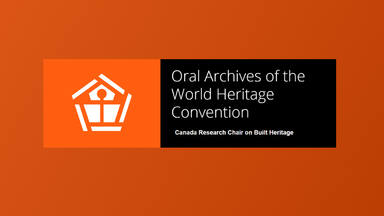
Interview
Eleonora Mitrofanova
World Heritage Convention
Eleonora Mitrofanova is a Russian diplomat and senior civil servant. She is a graduate of the Moscow State Institute of International Relations, specializing in international economics.
She worked as a researcher in the field of international maritime transport for fifteen years, before becoming a deputy of the State Duma from 1993 to 1995. From 1995 to 2001, she was an auditor at the Court of Accounts of the Russian Federation, where she was responsible for controlling public debt and the banking system. She then became Assistant Director-General of UNESCO for administration for two years before becoming director of the Centre for International Scientific and Cultural Cooperation of the Ministry of Foreign Affairs of Russia in 2004. In 2009, Mitrofanova was appointed as the Permanent Representative of the Russian Federation to UNESCO, a position she held until 2016, the year of her appointment as ambassador-at-large for the Ministry of Foreign Affairs. Since 2017, she has also chaired the Federal Agency for the Commonwealth of Independent States, compatriots living abroad and international humanitarian cooperation. As such, she oversees issues related to the support of the Russian language abroad, World Heritage and relations between Russia and Latin America.
As Permanent Representative of the Russian Federation to UNESCO, Eleonora Mitrofanova chaired UNESCO’s Executive Board in 2010-2011. She also led the Russian delegation to the World Heritage Committee from 2009 to 2016 and chaired the Committee at its 36th session in Saint Petersburg in 2012.
Interview with
Eleonora Mitrofanova
July 2019, Baku, Azerbaijan
The following audio extracts are from an interview with Eleonora Mitrofanova by Christina Cameron in July 2019 in Baku, Azerbaijan. She recounts her long experience at UNESCO and her views on the politicization of the World Heritage Committee, international cooperation and the particularities of World Heritage in Russia.
- 1. The World Heritage Convention
- 1a. Involvement of Eleonora Mitrofanova in World Heritage
- 1b. Key objectives of the World Heritage Convention
- 1c. Reform agenda at Cairns
- 1d. Decisions and specific cases having influenced the implementation of the Convention
- 1e. Synergies among cultural conventions of UNESCO
- 1f. Successes and failures of the Convention
- 2. World Heritage Committee
- 3. Performance of advisory bodies and World Heritage Centre
- 4. Involvement of States Parties
- 5. Terrorism and deliberate destruction of World Heritage
- 6. Involvement of civil society
Oral Archives of the
World Heritage Convention
Under the leadership of the Canada Research Chair on Built Heritage at the University of Montreal, an international team of researchers conducts interviews with pioneers of World Heritage to capture memories of important moments in the history of UNESCO Convention.
Launched in 2006, this initiative is part of the UNESCO History project that celebrated the 60th anniversary of the creation of UNESCO. The Oral Archives project records the precious witness of people closely associated with the creation and implementation of the Convention. Their recollections and views have greatly enriched the book by Christina Cameron and Mechtild Rössler, Many Voices, One Vision: The Early Years of the World Heritage Convention (Ashgate/Routledge, 2013).
